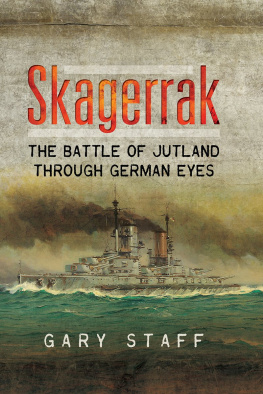Gary Staff - Skagerrak
Here you can read online Gary Staff - Skagerrak full text of the book (entire story) in english for free. Download pdf and epub, get meaning, cover and reviews about this ebook. year: 2016, publisher: Pen and Sword/Pen and Sword Maritime, genre: Non-fiction. Description of the work, (preface) as well as reviews are available. Best literature library LitArk.com created for fans of good reading and offers a wide selection of genres:
Romance novel
Science fiction
Adventure
Detective
Science
History
Home and family
Prose
Art
Politics
Computer
Non-fiction
Religion
Business
Children
Humor
Choose a favorite category and find really read worthwhile books. Enjoy immersion in the world of imagination, feel the emotions of the characters or learn something new for yourself, make an fascinating discovery.
- Book:Skagerrak
- Author:
- Publisher:Pen and Sword/Pen and Sword Maritime
- Genre:
- Year:2016
- Rating:4 / 5
- Favourites:Add to favourites
- Your mark:
- 80
- 1
- 2
- 3
- 4
- 5
Skagerrak: summary, description and annotation
We offer to read an annotation, description, summary or preface (depends on what the author of the book "Skagerrak" wrote himself). If you haven't found the necessary information about the book — write in the comments, we will try to find it.
Gary Staff: author's other books
Who wrote Skagerrak? Find out the surname, the name of the author of the book and a list of all author's works by series.
Skagerrak — read online for free the complete book (whole text) full work
Below is the text of the book, divided by pages. System saving the place of the last page read, allows you to conveniently read the book "Skagerrak" online for free, without having to search again every time where you left off. Put a bookmark, and you can go to the page where you finished reading at any time.
Font size:
Interval:
Bookmark:

Skagerrak
The Battle of Jutland Through German Eyes
Gary Staff

First published in Great Britain in 2016
and reprinted in 2016 by
PEN & SWORD MARITIME
An imprint of
Pen & Sword Books Ltd
47 Church Street
Barnsley, South Yorkshire S70 2AS
Copyright Gary Staff, 2016
ISBN 978 1 78383 123 4
eISBN 978 1 47388 098 6
Mobi ISBN 978 1 47388 097 9
The right o Gary Sta to be identi ied as Author o this work has been asserted by him in accordance with the Copyright, Designs and Patents Act 1988.
A CIP catalogue record or this book is available from the British Library
All rights reserved. No part of this book may be reproduced or transmitted in any orm or by any means, electronic or mechanical including photocopying, recording or by any information storage and retrieval system, without permission from the Publisher in writing.
Pen & Sword Books Ltd incorporates the Imprints o Aviation, Atlas, amily History, Fiction, Maritime, Military, Discovery, Politics, History, rchaeology, Select, Wharncliffe Local History, Wharncliffe True Crime, litary Classics, Wharncliffe Transport, Leo Cooper, The Praetorian Press, Remember When, Sea orth Publishing and Frontline Publishing.
For a complete list o Pen & Sword titles please contact
PEN & SWORD BOOKS LIMITED
47 Church Street, Barnsley, South Yorkshire, S70 2AS, England
E-mail:
Website: www.pen-and-sword.co.uk
O n 8 January 1916 the hitherto Chief of the German High Sea Fleet, Admiral Hugo von Pohl, was taken seriously ill and was transferred to a hospital ship, and from there he was taken to Berlin for an operation. Unfortunately, Admiral von Pohl had been afflicted with cancer and he never recovered, passing away after a brief time on February 23. His temporary replacement was the Commander of the III Squadron, Vizeadmiral Reinhard Scheer, and his appointment began a chain of events that would culminate in what to that date was the greatest sea battle in history, to the Germans the Skagerrak Battle, and to the British the Battle of Jutland.
In the Fleet there were fears that Vizeadmiral Scheer would not succeed Admiral von Pohl as Fleet Chief, and Vizeadmiral Hipper, the Commander of Reconnaissance Ships or B.d.A., set out his thoughts in his Nachla , his diary or bequest:
January 9. Our Fleet Commander, Admiral von Pohl, is ill a stomach ailment. It appears that he will take a long recovery time and therefore a new Fleet Commander must be appointed. Hopefully Scheer.
January 10. Vizeadmiral Scheer tentatively assumes command of the High Sea Fleet, in place of the ill Fleet Chief.
January 11. Heavy north storm, so that on the evening traffic with ashore is impossible. And so it goes day after day.
January 12. The risk that Admiral von Holtzendorff will get the Fleet, as I greatly feared, appears ended. Everything indicates that Scheer will take over. There are however, further changes in command necessary in the fleet, and from my cruiser commanders I will lose one or another.
Vizeadmiral Scheer was appointed Chief of the High Sea Fleet on 18 January 1916, and held this post until August 1918. He was born on 30 September 1863 in Obernkirchen, Lower Saxony, and entered the navy on 22 April 1879, undertaking normal cadet training, the final year of which included a world trip aboard the training ship Hertha , which travelled to Melbourne Australia, Yokohama, Kobe and Nagasaki in Japan, and Shanghai in China. From 1884 to 1886 he served in East Africa where he became friends with the later Admiral Holtzendorff. After his return to Germany he served in various positions, including two periods at the RMA (Imperial Navy Office), and as commander of the battleship Elsass from 1907 to 1909. When Vizeadmiral von Holtzendorff became Chief of the High Sea Fleet in 1909 Kapitn zur See Scheer was appointed his Chief of Staff. Promoted Kontreadmiral on 27 January 1910, Scheer took over as Director of the General Navy Department of the RMA in September 1911. In February 1913 he was appointed commander of the II Squadron and was promoted Vizeadmiral on 9 December 1913. Vizeadmiral Scheer took command of the III Squadron in December 1914 and held this post until assuming command of the Fleet.
After taking command as Chief of the High Sea Fleet, Vizeadmiral Scheer applied for, and was granted, the transfer of two of his trusted colleagues and friends to his Staff. Kapitn zur See von Trotha, formerly commander of SMS Kaiser , was appointed Chief of Staff, and Kapitn zur See von Levetzow was appointed Chief of the Operations Department. Vizeadmiral Hipper wrote:
January 2326. Meanwhile, one of my best commanders, Kapitn zur See von Levetzow of Moltke , was replaced as he was assigned to the Fleet Staff; replacement Kapitn zur See von Karpf. I entirely agree, although a new commander in the Unit must naturally first familiarise himself with the ship. Also the Commander of von der Tann , Hahn, was exchanged as an especially good artillerist is needed for the new dreadnought ship Bayern , which would enter service on 1 March.
The triumvirate of Scheer-Trotha-Levetzow brought with it a new offensive spirit and work on new operations for the Fleet in an offensive direction began immediately. Early in February Vizeadmiral Scheer went to a conference in Berlin where he set out his program. Nevertheless, the very first point acknowledged one of the realities of the current situation. The currently existing balance of forces initially forbids us to seek a decisive battle against the assembled English Fleet. Our sea war Leadership must also prevent this decisive battle being forced upon us by the enemy. However, the program continued:
Through planned, continuous exposure to the enemy we can force him from his waiting position to advance against us with certain forces which we can attack with favourable opportunities; but on the other hand we must avoid giving rise to a feeling of superiority by the enemy, whereby he would not be afraid to give us battle.
The shallowness of our opponent offers us the advantage that our inferior force can always act as the aggressor.
To achieve this aim, Vizeadmiral Scheer proposed merchant warfare with U-Bootes, the mine war, merchant warfare to the north, the aerial war and lively activity by advancing the High Sea Fleet. He also saw U-Boot warfare as the quickest method of dissuading Britain from continuing the war. He wrote That might be expected if success could be achieved either by a blow at her sea power centred on her Navy, or at her financial life, preferably both. And:
The then prevailing conditions of strength kept us from seeking a decisive battle with the enemy. Our conduct of the naval war was rather aimed at preventing a decisive battle being forced on us by the enemy. This might perhaps occur if our tactics began to be troublesome to him that he would try at all costs to get rid of the German Fleet. It might, for instance, become necessary, if the U-Boot war succeeded again in seriously threatening English economic life.
The interesting part of what Admiral Scheer said was that the U-Boot war was primarily aimed at damaging Britains economic strength, not mounting a hunger blockade as the British had done to Germany. In this the U-Bootes succeeded.
On 8 February 1916 the German Government announced that merchant ships carrying guns would be attacked without warning. Vizeadmiral Scheer objected to this half measure and went to Berlin on 1617 February to make his disagreement known. Later that month, on 23 February, the Kaiser, his brother Groadmiral Prinz Heinrich, State Secretary Admiral von Tirpitz and Chief of the Naval Staff Admiral von Holtzendorff, visited the Fleet at Wilhelmshaven. At the Offizieres Club the Kaiser agreed to Vizeadmiral Scheers program. Only the date for the commencement of the unrestricted U-Boot campaign remained to be fixed. Nevertheless, not all those present were convinced. Vizeadmiral Hipper wrote:
Font size:
Interval:
Bookmark:
Similar books «Skagerrak»
Look at similar books to Skagerrak. We have selected literature similar in name and meaning in the hope of providing readers with more options to find new, interesting, not yet read works.
Discussion, reviews of the book Skagerrak and just readers' own opinions. Leave your comments, write what you think about the work, its meaning or the main characters. Specify what exactly you liked and what you didn't like, and why you think so.













